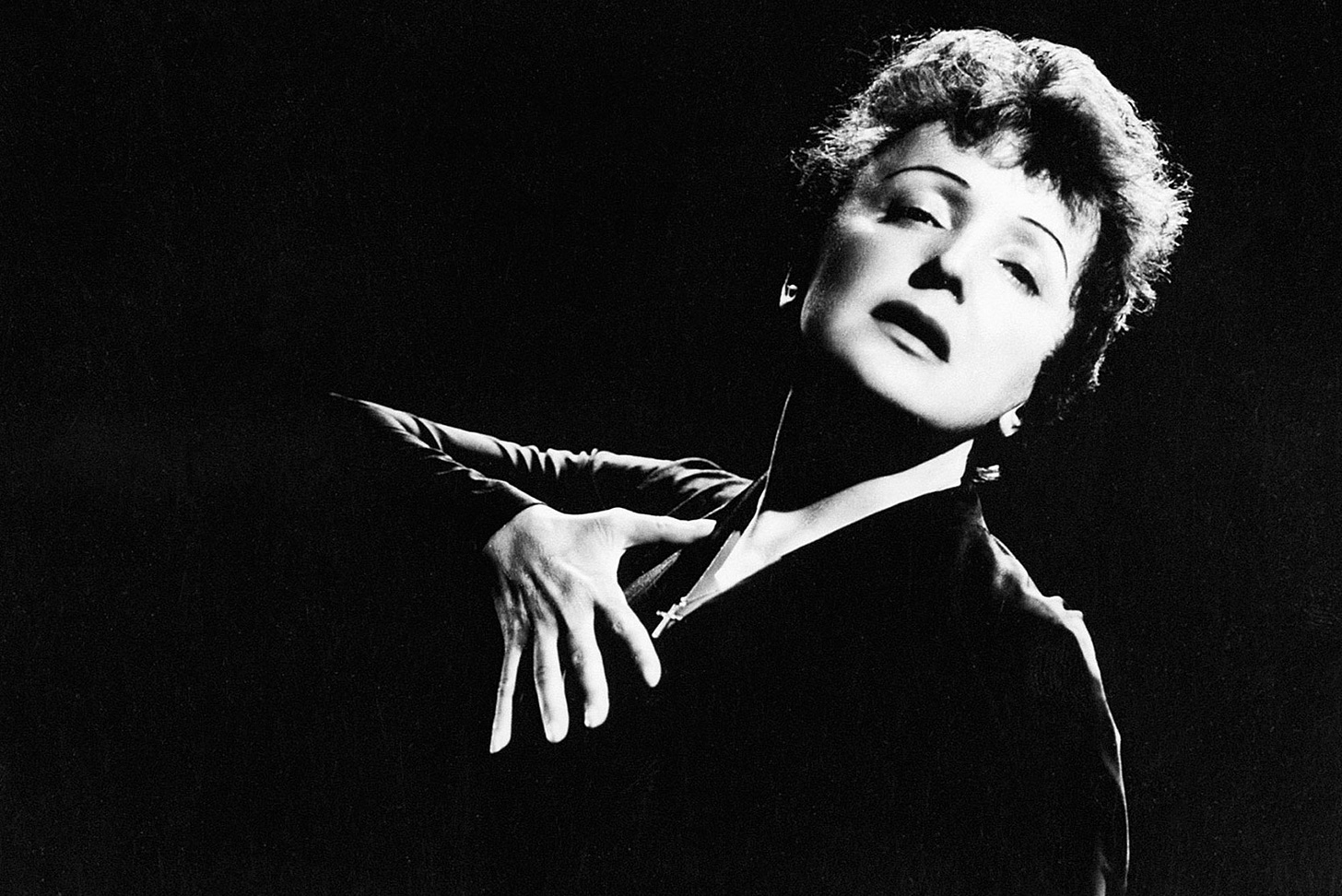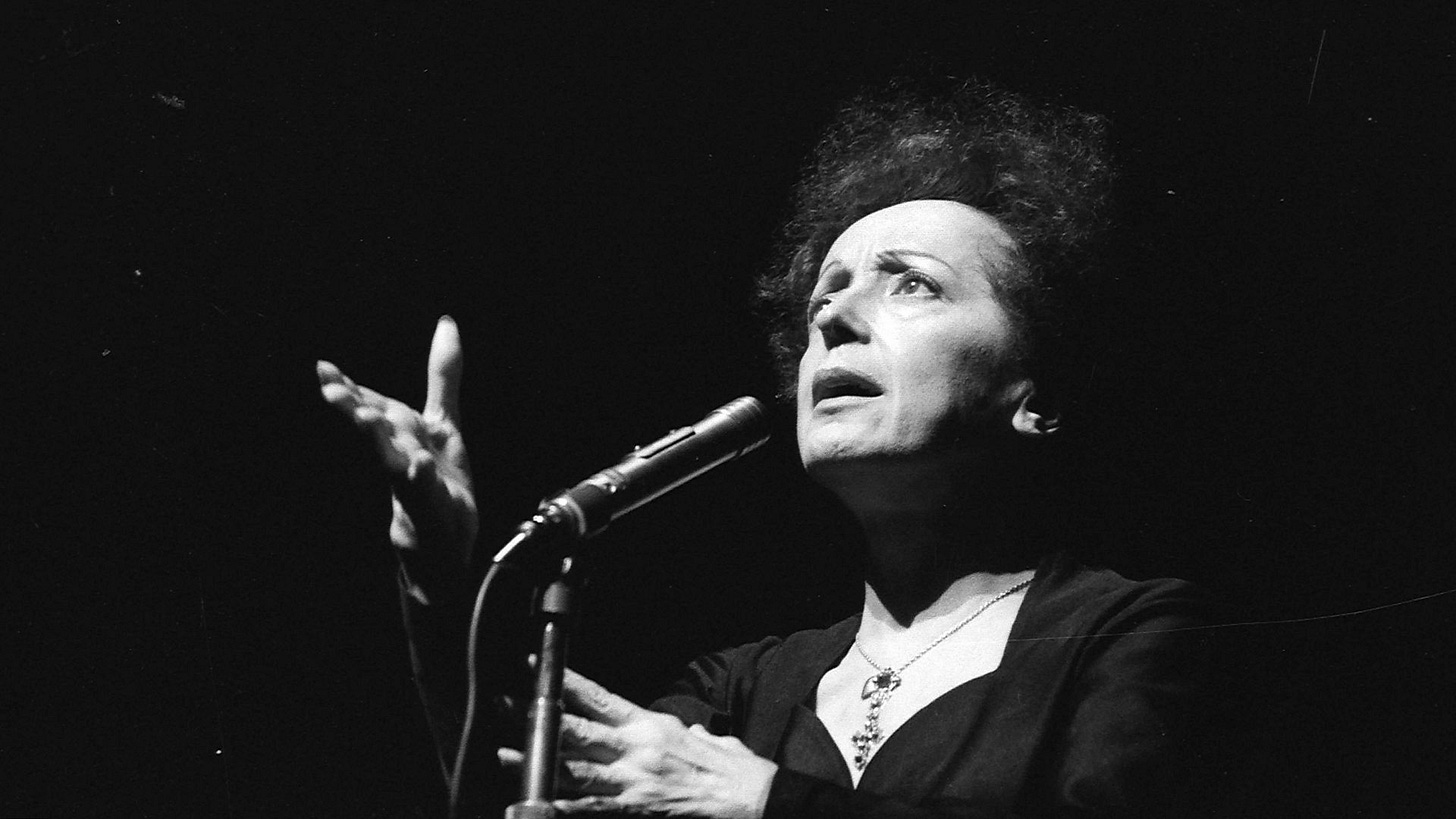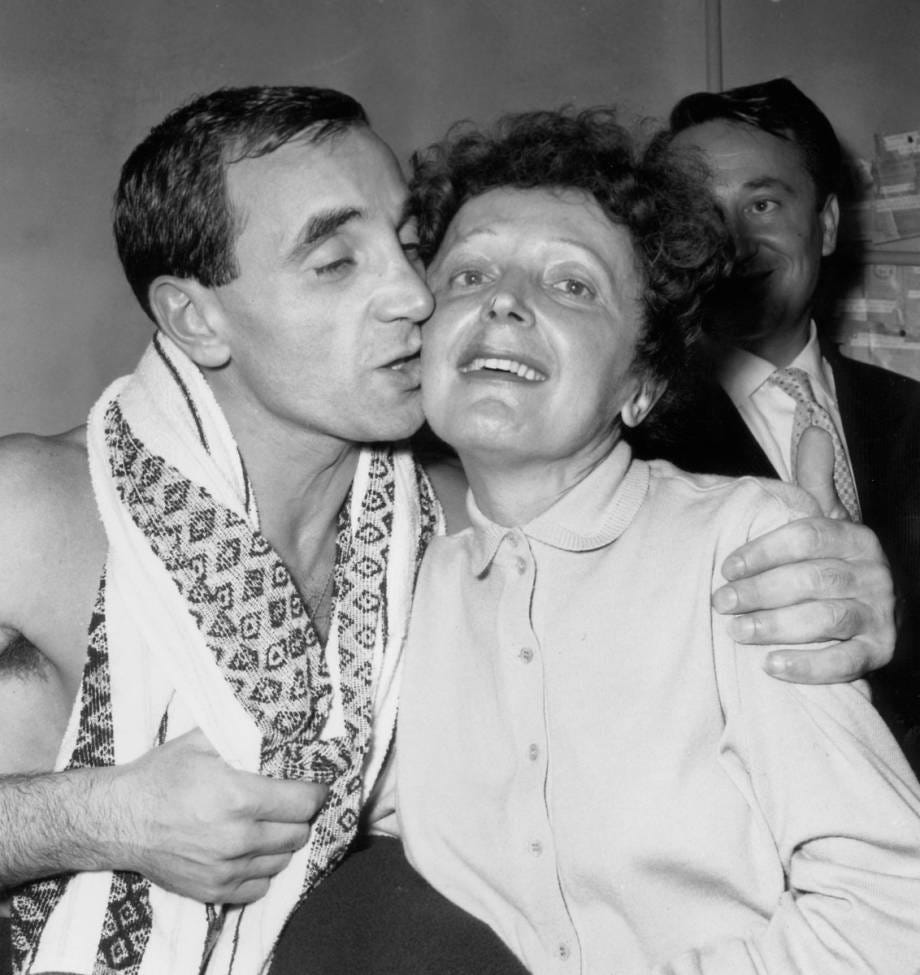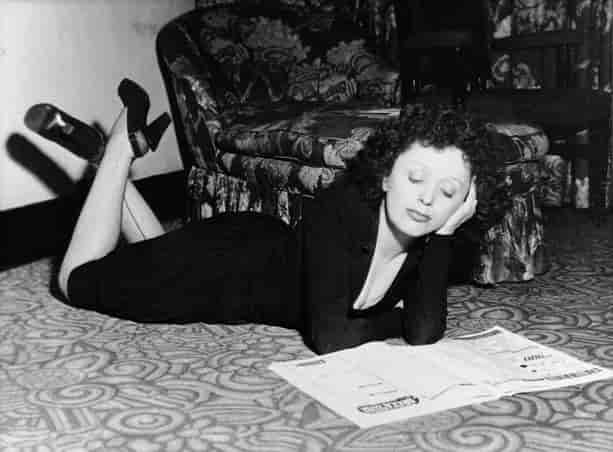This week, let’s explore a chanson that feels like a whispered secret wrapped in poetry. La Belle histoire d’amour is one of Édith Piaf’s lesser-known but deeply intimate songs, a quiet storm of longing, devotion, and memory.
Originally released in the later years of Piaf’s life, sung with the trembling vulnerability only she could summon, the song is both heartbreak and hope, anchored in a voice that seems to carry a century of love stories.
We’ll go further: not only into the lyrics and language, but also into Piaf’s extraordinary life, her pain, her passion, her poetry. If you’ve ever been curious about the woman behind La Vie en rose, this is your chance to meet her more intimately.
Tip: For the best learning experience, listen first, then read the lyrics while listening, then check the translation. Repetition is key, immerse yourself as much as you like!
Les Paroles :
Quand un homme vient vers moi
Je vais toujours vers lui
Je vais vers je-ne-sais-quoi
Je marche dans ma nuit
Je cherche à t'oublier
Et c'est plus fort que moi
Je me fais déchirer
Je n'appartiens qu'à toi
Je n'oublierai jamais
Nous deux, comme on s'aimait
Toutes les nuits, tous les jours
La belle histoire d'amour
La belle histoire d'amour
Pourquoi m'as-tu laissée?
Je suis seule à pleurer
Toute seule à chercher
Un jour où j'attendais
J'ai longtemps attendu
J'espérais, j'espérais
Tu n'es pas revenu
Je me suis révoltée
Je me suis résignée
J'ai crié, j'ai pleuré
J'ai nié, j'ai prié
Je n'oublierai jamais
Nous deux, comme on s'aimait
Toutes les nuits, tous les jours
La belle histoire d'amour
La belle histoire d'amour
Pourquoi m'as-tu laissée?
Je suis seule à pleurer
Toute seule à chercher
Quand un homme me plaît
J'fais des comparaisons
Je n'arrive jamais
À lui donner raison
C'est ta voix que j'entends
C'est tes yeux que je vois
C'est ta main que j'attends
Je n'appartiens qu'à toi
Je n'oublierai jamais
Nous deux, comme on s'aimait
Toutes les nuits, tous les jours
La belle histoire d'amour
La belle histoire d'amour
Pourquoi m'as-tu laissée?
Je suis seule à pleurer
Toute seule à chercher
J'espère toujours en toi
Je sais que tu viendras
Tu me tendras les bras
Et tu m'emporteras
La Traduction :
When a man comes to me
I always go to him
I go to I-don't-know-what
I walk through my night
I try to forget you
And I can't help it
I get torn apart
I belong only to you
I'll never forget
The two of us, how we loved each other
Every night, every day
The beautiful love story
The beautiful love story
Why did you leave me?
I'm alone crying
I'm alone searching
One day I was waiting
I waited a long time
I hoped, I hoped
You didn't come back
I rebelled
I resigned myself
I cried, I cried
I denied, I prayed
I'll never forget
The two of us, how we loved each other
Every night, every day
The beautiful love story
The beautiful love story
Why did you leave me?
I'm all alone crying
All alone searching
When I like a man
I make comparisons
I can never
prove him right
It's your voice I hear
It's your eyes I see
It's your hand I wait for
I belong only to you
I'll never forget
The two of us, how we loved each other
Every night, every day
The beautiful love story
The beautiful love story
Why did you leave me?
I'm alone crying
I'm alone searching
I still hope in you
I know you'll come
You'll hold out your arms to me
And you'll take me away
Rencontrez l'Artiste : Édith Piaf (1915–1963)
Do I really have to introduce her? No, you can be French, American, Italian, Indian or English...you know who is Édith Piaf. She stood just under five feet tall, a frail figure in a black dress with clenched hands and a tiny gold cross. But when she sang, she was ten feet tall. Édith Piaf wasn’t just a voice; she was a force of nature. France’s eternal sparrow, she poured her soul into every note.
A battered childhood, a celestial voice
Born Édith Giovanna Gassion in 1915 during the chaos of World War I, Piaf came into the world already surrounded by hardship. Her mother, a struggling singer, left her. Her father, a street acrobat, took little interest. She was passed between grandmothers, one of whom ran a brothel, and nearly went blind from neglect. According to legend, she regained her sight after a pilgrimage to the shrine of Saint Thérèse of Lisieux.
By the time she was a teenager, she was singing on Parisian street corners beside her father. Despite her tiny frame and sickly appearance, her voice stopped people in their tracks: raw, haunting, completely unforgettable.
From "La Môme Piaf" to a national treasure
In 1935, nightclub owner Louis Leplée discovered her and gave her the nickname La Môme Piaf, Paris slang for “the little sparrow.” The name stuck, and the legend began. Her first record, Les mômes de la cloche, came out in 1936 and was an instant hit.
But tragedy always shadowed Piaf. Leplée was murdered the following year, and Piaf was caught in the scandal. She fought her way back with the help of writers like Raymond Asso and the avant-garde genius Jean Cocteau, who saw her not just as a singer but as a born actress of emotion.
A life written in the ink of love and grief
So many of Piaf’s most famous songs are not just performances, they’re confessions. La Vie en rose, which she wrote herself, was born out of her love for singer Yves Montand. Hymne à l’amour was written in grief after her lover, the boxer Marcel Cerdan, died in a plane crash. She never recovered from the loss.
She wasn’t just a performer, she was a mentor and a star-maker. She championed artists like Les Compagnons de la Chanson, Charles Aznavour, and Georges Moustaki, shaping the course of chanson française far beyond her own recordings.
Pain, passion, and the stage as salvation
In the 1950s, Piaf suffered several car accidents and began taking painkillers heavily, which led to a long and painful addiction. Still, she worked relentlessly, recording and performing despite failing health. Her passion for the stage never dimmed.
In 1960, she performed Non, je ne regrette rien (“No, I regret nothing”), a thunderous anthem of defiance written for her by Charles Dumont. It became her signature song and saved the legendary Olympia concert hall from financial ruin.
She passed away in 1963, at just 47 years old. Her dear friend Jean Cocteau died the same day, saying, “Ah, this is the end of an era. Piaf is dead.”
Did You Know?
Piaf was just 1.47m (4'8") tall, but her voice filled opera houses around the world.
She wrote almost 100 songs, many of which people don’t realize she authored.
Marlene Dietrich called her “the soul of Paris.”
Charles Aznavour began as her assistant before launching his own legendary career.
In 1961, her concert series saved the Olympia from bankruptcy.
Marion Cotillard won an Oscar for portraying Piaf in La Vie en Rose (2007).
Her final duet, À quoi ça sert l’amour (“What’s the use of love?”), was sung with her last husband, Théo Sarapo, just before her health collapsed.
Vocabulaire clé & Expressions
Appartenir – to belong
Se faire + infinitif – to get [something] done to oneself
Je-ne-sais-quoi – a certain something / an indescribable quality
Se résigner – to resign oneself / to give up
Espérer en quelqu’un – to have hope in someone
Tendre les bras – to reach out one’s arms
Attendre – to wait
Se révolter – to rebel / to revolt
Comparer – to compare
Chercher – to search / to look for
Prier – to pray
Pleurer – to cry
Oublier – to forget
Points de grammaire
1. “Se faire + infinitif” → To have something done to oneself
→ Je me fais déchirer
This construction shows passive suffering or experience:
Il s’est fait gronder par sa mère. → He got scolded by his mother.
Elle s’est fait voler son sac. → She got her bag stolen.
It emphasizes the subject’s emotional or physical impact — useful in emotional storytelling.
2. Le passé composé et l’accord du participe passé
The passé composé (compound past) is one of the most used tenses in French. It’s formed with an auxiliary verb (either avoir or être) + the past participle of the main verb. But unlike in English, past participles sometimes agree in gender and number — and this song is full of great examples.
When to use être vs avoir
Most verbs use avoir:
→ J’ai pleuré, J’ai crié, J’ai nié, J’ai priéReflexive verbs (like se résigner, se révolter) always use être:
→ Je me suis révoltée, Je me suis résignée
Past participle agreement rules
With être
The past participle agrees in gender and number with the subject:
Je me suis révoltée → The subject is “je” (a woman), so add -e
Elles se sont résignées → Feminine plural → -ées
Rule:
If the verb uses être, the past participle agrees with the subject.
With avoir
The past participle does not agree with the subject—unless the direct object comes before the verb.
J’ai pleuré (no agreement)
La chanson que j’ai chantée (agreement with la chanson before the verb → chantée)
Tip:
No agreement with avoir unless something comes before the verb (like a relative pronoun que, or a direct object).
Start an immersive & poetic journey in French:
Welcome to French en Poésie ! Every Tuesday, I send out a carefully chosen French poem with audio, translation, grammar notes and cultural context. Thursdays bring literary excerpts, immersive, beautiful, and made for language lovers.
Dernière Pensée
La Belle histoire d’amour is not just about remembering, it’s about holding on. Even when abandoned, the narrator refuses to let the story end. It’s a chanson that speaks not to logic, but to the parts of us that linger, that ache, that believe.
In Piaf’s voice, love becomes fate, painful, irrevocable, and exquisitely human.
What about you? Do you have a favorite Édith Piaf song? Did you learn something new on this French icon?











I always resist identifying favourites, no matter the subject--it excludes too many things. That's certainly the case with Piaf. I first became acquainted with her music in 1978-1979 while among friends in Strasbourg. They were my age, and they all loved her. It so struck me since, as an American, the distance between what people of my generation listened to and that of my parents' was significant. Piaf transcended that gap with ease. (I remember recordings of Jeanne Moreau from that time as well, whose singing I also continue to enjoy.)
Thank you for this lovely episode!
Thank you for your comment! I like your philosophy on favorites, very true! :) Jeanne Moreau is great too!